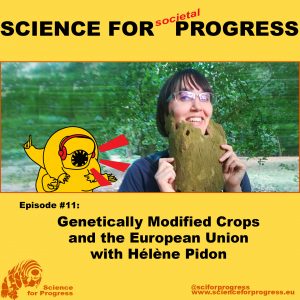Podcast: Play in new window | Download (Duration: 32:41 — 15.0MB)
Subscribe: Google Podcasts | RSS | More

Plant geneticists are not happy with the European judgement on gene editing
Dr. Hélène Pidon is a postdoctoral researcher at the Leibniz Institute of Plant Genetics and Crop Plant Research. She searches for genes that give plants resistance to diseases. She wants to use these genes to fortify cultivated Barley against these diseases, and thus reduce the amount of pesticides used to grow the plant. When the European Court of Justice ruled on the status of crops modified with gene editing methods like CRISPR, Hélène contacted me to talk with me about GMO crops.
Crops have been genetically modified for millennia
I was curios about the origins of agriculture and how simple artificial selection of nice looking plants affected their genomes.For Millennia, farmers would choose a particular good looking plant to sow it’s seeds in the next season. Unknowingly, they had a major impact on the whole genome of domesticated plants. For example, the size of the wheat genome tripled – a rather drastic modification. Plant scientists often view the cultivated plants as completely new species that can’t reproduce with their wild counterpart. Domesticated crops like these would not be able to survive in the wild and need constant attendance.
Industrialized Agriculture
With the population boom at the end of the 19th century, farmers needed to outsource their breeding efforts. Companies stepped in producing fertilizers, and pesticides, and also new breeding procedures. Now, specialized breeders would search for plants with valuable traits. These plants they would then cross with the currently used crop plant in order to create a new variety with the new trait. However, if you breed your ‘elite’ plant with another plant, the offspring also inherits many unwanted traits. In order to get back to a plant that has all the traits of the current elite crop, and the additional new one, the plants need to be back crossed with the elite variant many times. This is a very slow and tedious process.
Mutagenesis
To speed things up, breeders figured that it would be better to increase the variability in the offspring of the elite crop. This way they could simply select an elite crop with new randomly added trait. To do so, breeders use radiation or chemicals to induce a mutation rate that is higher than under natural conditions. This method has been very successful. Today, every major crop has undergone mutagenesis at some point.
Transgenesis and Gene Editing
Today, latest discoveries in genetics and developments of genetic methods allow to identify the genes underlying the beneficial traits breeders want to add to their crops. With transgenesis scientists have first become able to introduce complete genes into a genome. The source of this gene is irrelevant. So called ‘BT crops’ for example, are transgenic plants that received a bacterial gene that makes them resistant to certain insects. The insecticide these plants produce are proteins that acts very specifically against specific insect species. This allows the farmers to use less insecticides that may not be as specific. While this technique had some problems in the past regarding the positioning of the new gene in the genome, it has been improved greatly since it’s introduction.
The latest advancement in gene modification are gene editing techniques like CRISPR. Here, only a few base pairs are changed in a specific gene to change it’s properties.
The European Court of Justice rules that Gene Editing was unsafe
It is counter intuitive, but the EU prefers random gene modification with unknown collateral mutations over highly precise minimalist intervention with known outcomes.
Hélène explains her view on this situation covering topics like adaptation of agriculture to climate change, glyphosate, and organic farming.